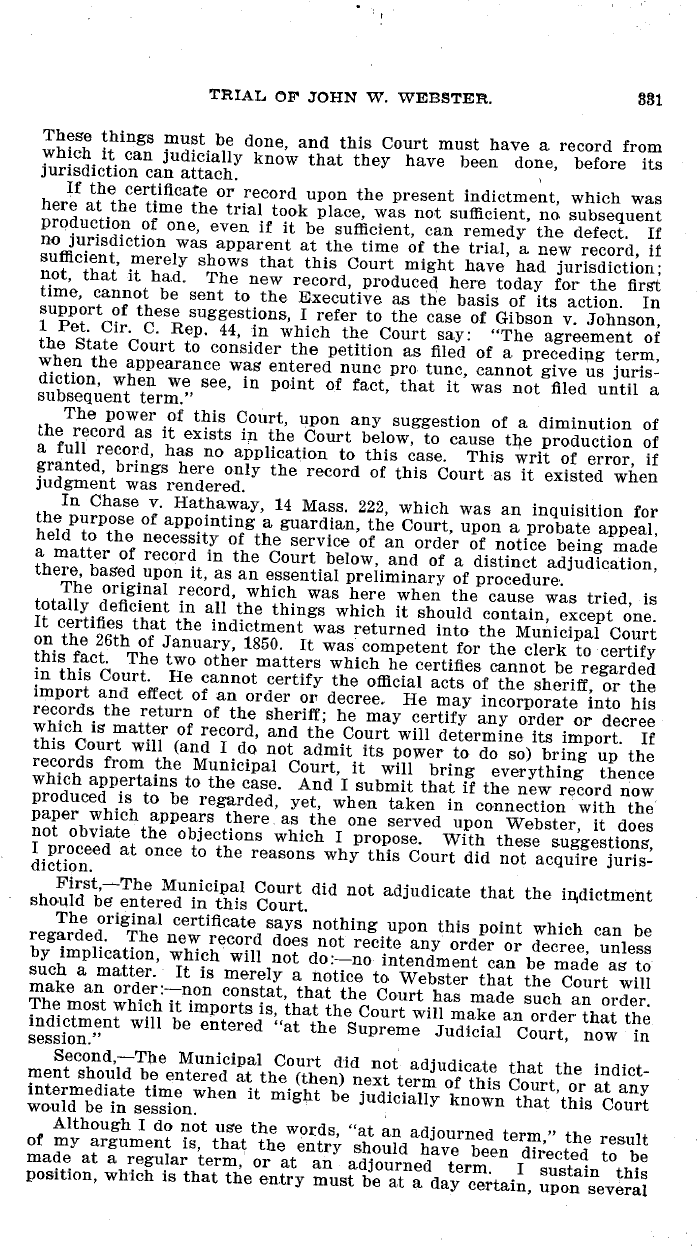|
1
TRIAL OF JOHN W. WEBSTER. $$1
These things must be done, and this Court must have a record from
which it can judicially know that they have been done, before its
jurisdiction can attach. ,
If the certificate or record upon the present indictment, which was
here at the time the trial took place was not sufficient, no subsequent
production of one, even if it be sufficient, can remedy the defect. If
no jurisdiction was apparent at the time of the trial, a new record, if
sufficient merely shows that this Court might have had jurisdiction;
not, that it had. The new record produced here today for the first
time, cannot be sent to the Executive as the basis of its action. In
support of these suggestions, I refer to the case of Gibson v. Johnson,
1 Pet. Cir. C. Rep. 44, in which the Court say: "The agreement of
the State Court to consider the petition as filed of a preceding term,
when the appearance was entered nunc pro tune, cannot give us juris-
diction, when we see, in point of fact, that it was not filed until a
subsequent term."
The power of this Court, upon any suggestion of a diminution of
the record as it exists in te Court below, to cause the production of
a full record, has no application to this case. This writ of error, if
granted, brings here only the record of this Court as it existed when
judgment was rendered.
In Chase v. Hathaway, 14 Mass. 222, which was an inquisition for
the purpose of appointing a guardian, the Court, upon a probate appeal,
held to the necessity of the service of an order of notice being made
a matter of record in the Court below, and of a distinct adjudication,
there, based upon it, as an essential preliminary of procedure.
The original record, which was here when the cause was tried, is
totally deficient in all the things which it should contain, except one.
It certifies that the indictment was returned into the Municipal Court
on the 26th of January, 1850. It was competent for the clerk to certify
this fact. The two other matters which he certifies cannot be regarded
in this Court. He cannot certify the official acts of the sheriff, or the
import and effect of an order or decree. He may incorporate into his
records the return of the sheriff he may certify any order or decree
which is matter of record, and the Court will determine its import. If
this Court will (and I do not admit its power to do so) bring up the
records from the Municipal Court, it will bring everything thence
which appertains to the case. And I submit that if the new record now
produced is to be regarded, yet, when taken in connection with the
paper which appears there. as the one served upon Webster, it does
not obviate the objections which I propose. With these suggestions,
I proceed at once to the reasons why this Court did not acquire juris-
diction.
First,-The Municipal Court did not adjudicate that the indictment
should be entered in this Court.
The original certificate says nothing upon this point which can be
regarded. The new record does not recite any order or decree unless
by implication, which will not do: no intendment can be made as to
such a matter. It is merely a notice to Webster that the Court will
make an order:-non constat that the Court has made such an order.
The most which it imports is, that the Court will make an order that the
indictment will be entered "at the Supreme Judicial Court, now in
session.
Second,-The Municipal Court did not adjudicate that the indict-
ment should be entered at the (then) next term of this Court, or at any
intermediate time when it might be judicially known that this Court
would be in session.
Although I do not use the words, "at an adjourned term," the result
of my argument is that the entry should have been directed to be
made at a regular term or at an adjourned term. I sustain this
position, which is that the entry must be at a day certain, upon several
|

